Brothers Committed to Mutual Assistance
by Song Ran
[Ethiopia] Meseret Gebrehiwot
There is an old saying meaning "There is no spectator in life" in Ethiopia, the "Roof of Africa". It suggests that everyone has their own responsibilities and obligations in life.
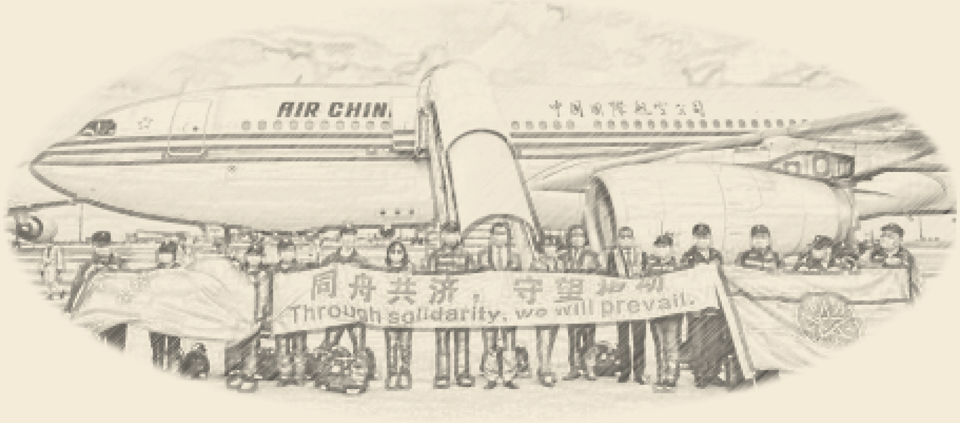
And everyone is connected, so no one is immune from challenges. The connotation is similar to the philosophy of a global community of shared future, exemplified by the global cooperation in combating Covid-19.
Fighting Covid-19 Together
When China was passing through its most difficult phase of the epidemic in February 2020, Ethiopian Prime Minister Abiy Ahmed Ali wrote two letters to Chinese President Xi Jinping to convey his support and sympathy. He was also the first African leader to hold a phone conversation with Xi during the epidemic. Calling China a close friend and brother of Ethiopia, the prime minister said, "When we are in need of help, China has always been there. Now that China is in difficulties, the Ethiopian people must stand together with the Chinese people to overcome the difficulties."
To prevent infections from China to Ethiopia, the Chinese organizations and enterprises in Ethiopia maintained stringent monitoring of their personnel and required all Chinese employees coming to Ethiopia scrupulously followed 14 days' isolation at home upon arrival. In addition, experts from the Chinese Center for Disease Control and Prevention advised the Chinese Chamber of Commerce and Chinese enterprises in Ethiopia on home quarantine.
On March 13, Ethiopia's Ministry of Health announced the first Covid-19 case in the country. The Ethiopian Government enforced quarantine and later nucleic acid tests for arrivals from other countries and restricted mass gatherings. Thanks to these measures, Ethiopia successfully controlled the virus at the initial stage.
But when it eventually spread, China sent a medical team to Ethiopia, the first Chinese medical team to Africa for Covid-19 control. The Chinese Government invited the Ethiopian authorities to more than 10 anti-Covid-19 video conferences. Under a cooperation mechanism, in which Chinese hospitals pair up with African hospitals, three Ethiopian medical institutions teamed up with their Chinese counterparts to strengthen technical exchanges and cooperation to fight the pandemic.
It also sent medical supplies. Seven provinces, cities and autonomous regions in China and over 50 enterprises and charities chipped in with medical supplies worth over RMB40 million (USD5.8 million). Many Chinese enterprises in Ethiopia acted promptly, importing equipment and raw materials from China to build production lines for manufacturing face masks, disinfectants and test kits, alleviating the local shortage of protective supplies.
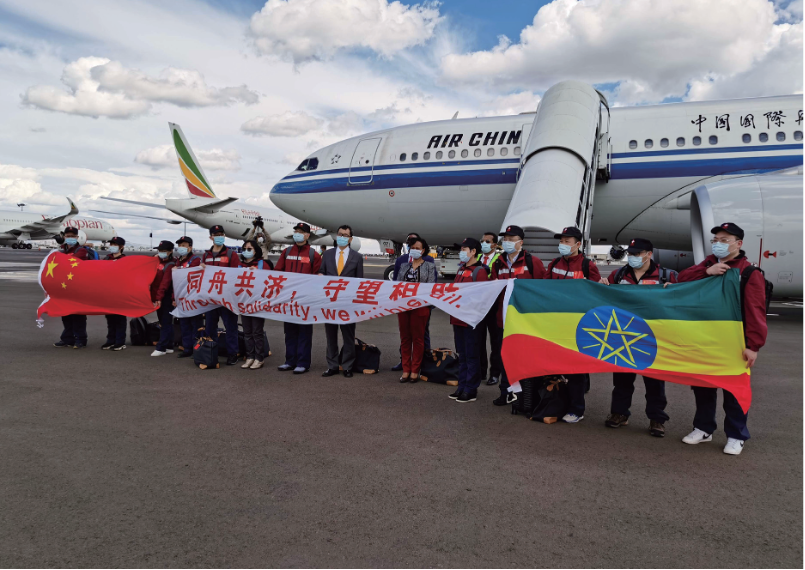
Members of a Chinese medical team pose for a photo at the airport upon their arrival in Addis Ababa, Ethiopia.
The Ethiopian Government and society have appreciated the gestures. In June, Abiy Ahmed attended the Extraordinary China-Africa Summit on Solidarity against Covid-19 by video link, where he expressed support again for China's initiative to work together to defeat the pandemic.
Fighting the Pandemic Together
As comprehensive strategic partners, the governments of China and Ethiopia have supported and helped each other since the outbreak of Covid-19. So have the people and enterprises of the two countries.
The Wuxi No.1 Cotton Mill in the city of Dire Dawa in eastern Ethiopia donated 100,000 surgical masks and 100 thermometers to government departments. The enterprise, jointly invested by a Chinese company with the same name and the Hong Kong-based Yangtzekiang Garment Ltd., had begun operation only on October 16 last year. No.1 Cotton mainly produces high-end yarn-dyed, knitted fabrics and home textiles for international brands, and has stimulated the development of downstream industries in Ethiopia. In June 2018, the first phase project of a 100,000-spindle workshop began construction and was put into operation about 400 days later.
Jifar Edris, the assistant director of the workshop, said, "Many of us were still getting familiar with the new environment and learning new techniques. Under the guidance of our Chinese mentors, we had made progress. Nobody had anticipated such an epidemic. My supervisor, who is from Jiangsu Province in east China, stayed on with us instead of going home during the Chinese New Year celebrations, the traditional time for family reunions in China, to ensure work progress. When Covid-19 cases were reported in his hometown, it was an especially worrying time for him but he pressed on with the work. Eventually, he was relieved to be told that his family was safe."
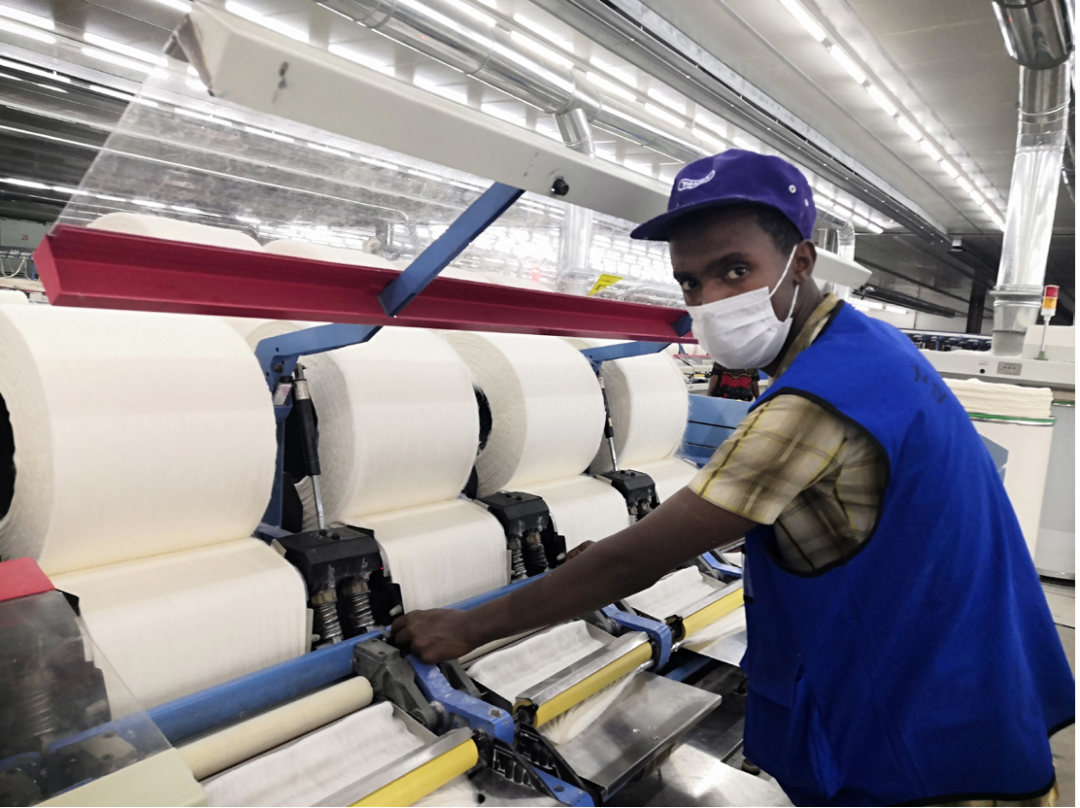
Jifar Edris at work
After the first confirmed case in Ethiopia, No.1 Cotton established an advisory team to make an epidemic prevention plan and continue work safely. Employees were mandated to wear masks at work and have their temperatures checked at the entrance. They were asked to wash their hands frequently, have their meals at work separately, and register when coming in and going out. As masks, disinfectants and other epidemic-control supplies were scarce, the factory ensured the workers had an adequate supply. The plant and offices were regularly disinfected while a quarantine area was created for employees returning from outside the city.
As a preventive measure, the Ethiopian transport authorities had asked state buses to carry less than 50 percent of passenger capacity. Since it took some employees more than two hours to come to work, the factory provided free accommodation and meals for those living far away.
When Covid-19 cases increased in Ethiopia, the city government began taking more stringent measures. No.1 Cotton employees underwent the decisive nucleic acid test while people suspected of having the virus or having come in touch with a patient were quarantined. Then the mill had to suspend work for some time. However, it still went on paying its employees.
Messi, a worker at the plant, called the company caring. "The manager is concerned about every one of us," she said.
She said the pandemic and ensuing reduced orders at the factory made her depressed and anxious about her job. Sensing her anxiety, the manager carefully explained the situation to her, including how the factory was responding, which made her feel more optimistic.
Messi had been trained in spinning and weaving in China and besides her mother tongue Amharic speaks Chinese and English. From a new recruit, she is now one of the backbone staff of No.1 Cotton.
Taking Care of Each Other's Nationals
When the novel coronavirus disease erupted in Wuhan, a major city in central China, hundreds of Ethiopian students studying there were unable to return home due to city being locked down. President Xi spoke with Prime Minister Abiy Ahmed by telephone, promising the Chinese authorities would do their best to look after the Ethiopian and other international students.
As of September 2020, none of the Ethiopian students in China had been infected or faced difficulties.
David is one of them. A business administration student at Wuhan University, he recorded on his smartphone his life and experiences in Wuhan during Covid-19. The photos, videos and texts show cherry blossoms, hearty meals, a solicitous dormitory manager, video greetings from his classmates, and the Wuhan city that is coming back to life. David shared them on social media – on Twitter, WeChat and Weibo. They set his parents in Ethiopia at ease while presenting the real picture of Wuhan and China's fight against the epidemic.
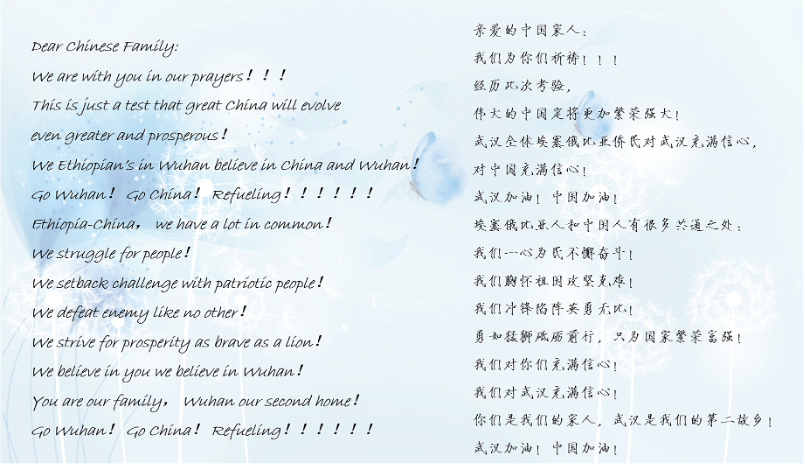
Ethiopian students in Wuhan express solidarity with Wuhan and China.
In the southern Chinese city of Guangzhou, Teferi Melesse Desta, who was the Ethiopian consul general at that time, said there were fewer Ethiopians in the city compared to people from other African countries. They study or work in Guangzhou and travel between Guangzhou and Addis Ababa, "building a bridge of friendship and cooperation between the two cities."
During the outbreak, the Chinese local authorities gave much thought to counseling foreign residents. "Overall, the Ethiopians live a happy life in Guangzhou, even in the battle against the pandemic," Teferi said. He called the cooperation and friendship between Ethiopia and China a historical source and emotional basis for the two countries' joint efforts in fighting Covid-19 and pursuing common development. "China and Africa are true friends. We will certainly prevail over the pandemic," he said.
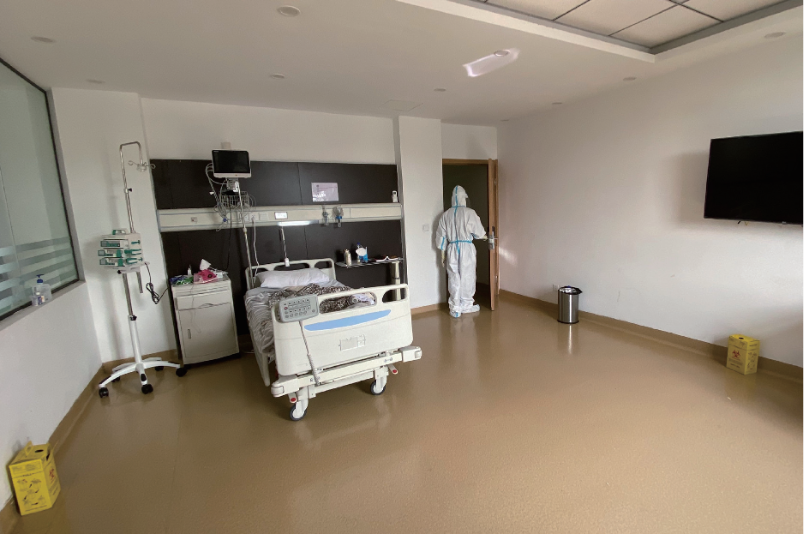
An isolation ward at the renovated Addis Ababa Silk Road General Hospital
Since Ethiopia reported its first Covid-19 case, due to insufficient medical resources and designated hospitals in Ethiopia, the governments of the two countries collaborated to upgrade the Addis Ababa Silk Road General Hospital into Ethiopia's best designated hospital for treating Covid-19 patients. The two countries have already cooperated on traditional Chinese medicine (TCM) treatment, so TCM was also introduced in the Covid-19 treatment. By September 2020, most of 100 Chinese Covid-19 patients in Ethiopia had been promptly treated and recovered.
Jointly Safeguarding the Lifeline
With the global spread of the disease, many African countries suspended international flights. Standing up to intense pressure at home and from abroad, the Ethiopian Prime Minister kept routes to China open to ensure normal trade and personnel exchange between the two countries. Ethiopian Airlines was the only airline operating direct flights between Africa and China. It bore the responsibility of delivering protective supplies to Ethiopia from China and other countries as well as transiting travelers.

Medical supplies donated by China to Africa to fight Covid-19 are transported by Ethiopian Airlines.
Ethiopian Airlines safely brought back to China 20 Chinese agricultural experts who had fulfilled their work in Ethiopia, some Chinese who wanted to go back home for treatment for leukemia, and Chinese citizens in other African countries, including South Sudan, Mozambique and Djibouti. Also, at the critical juncture of the fight against the virus, the airline served as an important channel to transport Chinese protective supplies to 22 African countries.
Thanking China for the timely medical supplies on behalf of the recipient countries and the Permanent Representatives' Committee of the African Union (AU), Lesotho's ambassador to Ethiopia said the government and people of China stood at the forefront to assist Africa. It was because of China and other international partners' support that African countries have enhanced their capability and confidence to defeat the virus.
FOR MORE
Project Overview:
China and Ethiopia have a close partnership. Since Covid-19 struck, Ethiopia and many other African countries have supported China and vice versa to contain the spread of the virus. It reflects the construction of an even stronger China-Africa community of shared future.
Since the global spread of the virus, China has provided protective supplies to the AU and African countries, and organized experts' video conferences to exchange epidemic control experience. Chinese enterprises and non-governmental organizations have donated medical supplies, kept cargo transportation flowing smoothly, and adopted stringent quarantine and containment measures.
On June 17, 2020, the Extraordinary China-Africa Summit on Solidarity against Covid-19 was held via video link. Leaders of more than 10 African countries including Ethiopia, as well as the African Union Commission Chair Moussa Faki Mahamat, United Nations Secretary-General Antonio Guterres and World Health Organization Director-General Tedros Adhanom Ghebreyesus attended the summit. Chinese President Xi Jinping delivered a keynote speech at the summit, titled "Defeating COVID-19 with Solidarity and Cooperation".
Xi said China and Africa must stay committed to fighting Covid-19 together, enhancing their cooperation, upholding multilateralism, and taking their friendship forward. Both should take concrete steps to deliver the commitments made at the Beijing Summit of the Form on China-Africa Cooperation in 2018 to work together to build an even stronger China-Africa community of shared future and do their part in the international cooperation against Covid-19.
The summit issued the Joint Statement of the Extraordinary China-Africa Summit on Solidarity Against COVID-19, which signaled to the international community the strong solidarity and cooperation between China and Africa.


